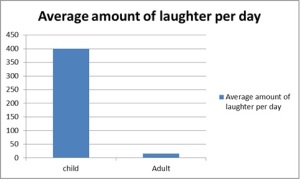Humor at Its Best
The very distinct laughter echoed from a few isles over. I smiled to myself. Without having to even see that person or walk down a few isles in the grocery store, that laugh told me who was there. I knew the loud, high pitched giggle belonged to no one else than my wife Sara. Anyone that knows Sara, knows that she can laugh. It is one of her best traits. One thing we share in common is our ability to laugh. However, it raises the question in our minds as to what our kid’s laughs will sound like. Will they get the Shupe high-pitched loud giggle or will they get the Fausett taunting chuckle?
Humor as the Escape
Humans begin to laugh from as early as seventeen days after being born. As they grow older, the amount they laugh increases dramatically followed by a gradual decrease to adulthood.
 “Adults, especially, hold stress within their bodies and manage their anxieties by self-medicating with such things as drugs, alcohol, and television. However, children seem to naturally adopt laughter as a cleansing strategy. Preschool kids, according to Strubbe, laugh ‘up to 400 times a day; the average adult chuckles a mere 7 to 15 times.’ Small wonder kids don’t hold on to things for long.” (Rozek) This is a very surprising result because in today’s society of stressed work environments and broken families the human race could all learn to laugh a little bit more in life.
“Adults, especially, hold stress within their bodies and manage their anxieties by self-medicating with such things as drugs, alcohol, and television. However, children seem to naturally adopt laughter as a cleansing strategy. Preschool kids, according to Strubbe, laugh ‘up to 400 times a day; the average adult chuckles a mere 7 to 15 times.’ Small wonder kids don’t hold on to things for long.” (Rozek) This is a very surprising result because in today’s society of stressed work environments and broken families the human race could all learn to laugh a little bit more in life.
Recently, there has been more research in the field of adding humor to our lives. Gelology is a funny enough word by itself; however, it is the study of humor and laughter and the effects it has on the human body. As research continues in this field there will be a continued push for humor in society.
Gelology is making profound research on how it is affecting the human body and overall health. Kyle Hunter (Professor Science) a lead science educator at Helena’s ExplorationWorks museum and he says, “Gelotologists have actually found a number of different health benefits from laughing, stress relief being one of them. Laughter also can strengthen the immune system and reduce food cravings.” (Hunter) Laughing has many great health benefits. Adding humor to the human life style may seem childish; however, it is extremely healthy for the body.
Humor as the Teacher
Humor is extremely useful in several ways: reducing stress, improving moral, and helping students to learn. “Based on experimental studies presented, humor appears to be an efficient aid in developing creative thinking in adolescents.” (Using Humor to develop creative thinking) This is giving evidence on how humor is beginning to help students develop creative skills. This also gives some evidence for why the mind can recall information if that person has found something humorous about the information.
Recently some research has been published on how humor in the classroom is helping students. Maryellen Weimer PhD an educational blogger for the “The Teaching Professor Blog” has summed up an article written about research that has been done over the last 4 decades.
 “Other research documents that the presence of humor creates a more relaxed classroom environment. It helps relieve tension and stress, and makes students less anxious about making mistakes… there is a ‘substantial amount’ of evidence that shows the effectiveness of humor at attracting and maintaining students’ attention. If students are not paying attention, then it’s a pretty sure bet they are not learning the content, at least not at that moment. Rather, than actually causing learning, it seems more likely that humor helps to create conditions that are conducive to learning.” (Weimer)
“Other research documents that the presence of humor creates a more relaxed classroom environment. It helps relieve tension and stress, and makes students less anxious about making mistakes… there is a ‘substantial amount’ of evidence that shows the effectiveness of humor at attracting and maintaining students’ attention. If students are not paying attention, then it’s a pretty sure bet they are not learning the content, at least not at that moment. Rather, than actually causing learning, it seems more likely that humor helps to create conditions that are conducive to learning.” (Weimer)
While there is no conclusive evidence about if humor helps students’ grades or helps students learn. There is lots of supportive evidence about keeping a friendly student-teacher classroom environment. It also gives evidence to support that students are more likely to be learning the material in class because it is entertaining. This may encourage students to come to class and learn the material rather than away from the classroom. Table 1 lists different types of humor that are appropriate for the classroom setting.
Humor as the Future
As a society we will continue to see tragic events, disasters, and all manner of life stresses. These are unavoidable facts of life. However, I hope that as a society we will develop a greater understanding of how to deal with these events. It is my wish that we will all learn to add a little bit more humor into our lives to handle these life stresses. Although the human race doesn’t understand everything about humor yet they do know that research is supporting evidence that suggest added health benefits.
While my wife and I don’t know what our kids laugh will sound like. We can ensure you that their laughs will be contagious. Our only wish is to give them the courage to laugh through life’s greatest challenges. As parents we will continue to encourage them to laugh; we will also develop more humor in our own lives.
Sources
Banas, John A, Norah Dunbar, Dariela Rodriguez, and Shr-Jie Liu. “A Review of Humor in Education Settings: Four Decades of Research.” Communication Education. (2010): n. page. Web. 25 Mar. 2013. <http://cas.ou.edu/Websites/oucas/images/Banas_CE2011.pdf>.
Hunter, Kyle. “Gelotology: A laughing Matter.” Independent Record [Helena Montana] 15 Sept 2010, n. pag. Web. 11 Mar. 2013. <http://helenair.com/lifestyles/health-med-fit/gelotology-a-laughing-matter/article_541ae642-c099-11df-af06-001cc4c03286.html>.
Rozek, Victor. “As I See It: Keep Laughing.” Laughter Yoga. n. page. Web. 11 Mar. 2013. <http://laughteryoga.org/index.php?option=com_content&view=article&id=1302:as-i-see-it-keep-laughing-&catid=237:news-archive&Itemid=480>.
“Using Humor to develop creative thinking.” Jornal of Children in Contmporary Society. 20.1-2 (2008): n. page. Web. 11 Mar. 2013. <http://www.tandfonline.com/doi/abs/10.1300/J274v20n01_07>.
Weimer, PhD, Maryellen. “Humor in the Classroom: Reviewing the Research.” Faculty Focus. 18 Nov 2011: n. page. Web. 25 Mar. 2013. <http://www.facultyfocus.com/articles/teaching-professor-blog/humor-in-the-classroom-reviewing-the-research/>.
Pictures
The classroom laughing: http://25.media.tumblr.com/tumblr_m0isy8AOlu1qbnugoo1_500.jpg

